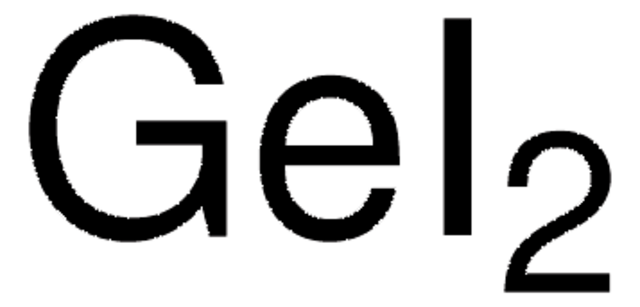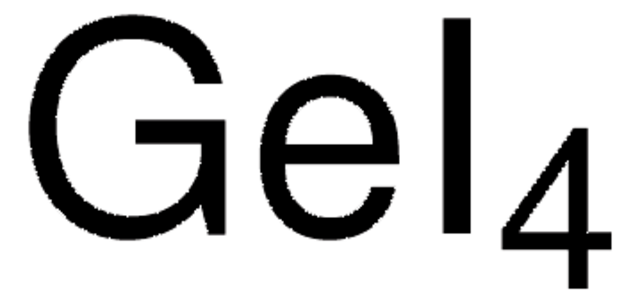203351
Germanium
powder, −100 mesh, ≥99.99% trace metals basis
Sign Into View Organizational & Contract Pricing
All Photos(3)
About This Item
Empirical Formula (Hill Notation):
Ge
CAS Number:
Molecular Weight:
72.64
EC Number:
MDL number:
UNSPSC Code:
12141716
PubChem Substance ID:
NACRES:
NA.23
Recommended Products
Quality Level
Assay
≥99.99% trace metals basis
form
powder
resistivity
53 Ω-cm, 20°C
particle size
−100 mesh
bp
2830 °C (lit.)
mp
937 °C (lit.)
density
5.35 g/mL at 25 °C (lit.)
SMILES string
[Ge]
InChI
1S/Ge
InChI key
GNPVGFCGXDBREM-UHFFFAOYSA-N
Looking for similar products? Visit Product Comparison Guide
Signal Word
Danger
Hazard Statements
Precautionary Statements
Hazard Classifications
Aquatic Acute 1 - Aquatic Chronic 2 - Flam. Sol. 1 - Repr. 2 - STOT RE 2 Oral
Target Organs
Kidney
Storage Class Code
4.1B - Flammable solid hazardous materials
WGK
WGK 3
Flash Point(F)
Not applicable
Flash Point(C)
Not applicable
Personal Protective Equipment
dust mask type N95 (US), Eyeshields, Gloves
Choose from one of the most recent versions:
Already Own This Product?
Find documentation for the products that you have recently purchased in the Document Library.
Customers Also Viewed
Minxian Wu et al.
Physical chemistry chemical physics : PCCP, 15(14), 4955-4964 (2013-02-27)
The electrodeposition of germanium from the ionic liquid 1-butyl-1-methylpyrrolidinium dicyanamide ([BMP][DCA]) and a mixture of [BMP][DCA] and 1-butyl-1-methylpyrrolidinium chloride ([BMP]Cl) was studied using cyclic voltammetry and using an electrochemical quartz crystal microbalance (EQCM). [GeCl4(BuIm)2] (BuIm = N-butylimidazole) was used as
Miroslav Cerný et al.
Journal of physics. Condensed matter : an Institute of Physics journal, 25(3), 035401-035401 (2012-12-15)
The response of three covalent crystals with a diamond lattice (C, Si and Ge) to uniaxial and a special triaxial (generally nonhydrostatic) loading is calculated from first principles. The lattice deformations are described in terms of variations of bond lengths
Philippe Jund et al.
Journal of physics. Condensed matter : an Institute of Physics journal, 25(3), 035403-035403 (2012-12-15)
We report an ab initio study of the semiconducting Mg(2)X (with X = Si, Ge) compounds and in particular we analyze the formation energies of the different point defects with the aim of understanding the intrinsic doping mechanisms. We find that the
Fabian von Rohr et al.
Journal of physics. Condensed matter : an Institute of Physics journal, 25(7), 075804-075804 (2013-01-25)
The thermoelectric properties between 10 and 300 K and the growth of single crystals of n-type and p-type GeBi(4)Te(7), GeSb(4)Te(7) and Ge(Bi(1-x)Sb(x))(4)Te(7) solid solution are reported. Single crystals were grown by the modified Bridgman method, and p-type behavior was achieved
Jian-Qiang Shen et al.
Dalton transactions (Cambridge, England : 2003), 42(16), 5812-5817 (2013-03-05)
An unprecedented organic-inorganic hybrid germanoniobate compound Na4[Cu(en)2(H2O)2]5[Na6Ge8Nb32O108H8(OH)4]·41H2O (1) was synthesized under the hydrothermal condition. In compound 1, the {Nb16} cage containing four {GeO4} tetrahedra in its internal cavity results in a heteropolyniobate anion [H4Ge4Nb16O54(OH)2](10-) ({Ge4Nb16}), which is connected by a
Our team of scientists has experience in all areas of research including Life Science, Material Science, Chemical Synthesis, Chromatography, Analytical and many others.
Contact Technical Service








